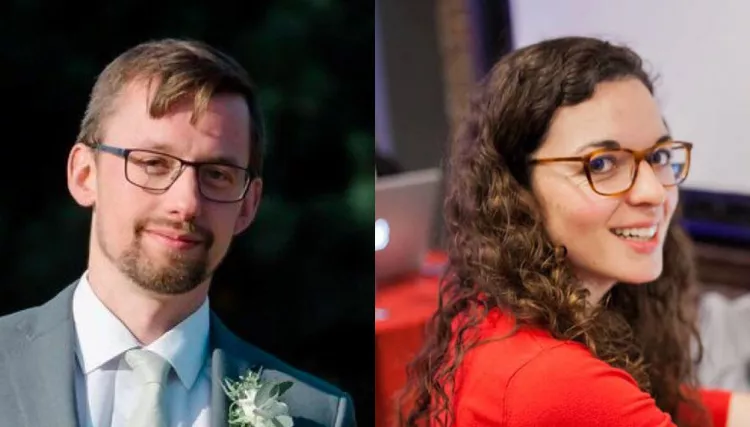Emma Ferguson '10 and Colin Schimmelfing '10 Collaborate to Bring PPE to Frontline Workers

Colin Schimmelfing '10 (left) and Emma Ferguson '10 have helped nearly 6,000 donors to send more than 666,000 masks to nearly 7,000 recipients.
Philadelphia Citizen: Two Swarthmore alums are using their tech skills to get PPE in the hands of those who need it most
When you’re an undergrad at Swarthmore College, where total enrollment hovers at about 1,650, it’s basically impossible not to know your classmates.
“Swarthmore is so small, that even though we weren’t friends, we definitely knew each other and were in the same friend circle,” says alum Emma Ferguson '10 about classmate Colin Schimmelfing '10.
After graduating, Ferguson, a theater major at Swarthmore, stuck around Philly, working in the nonprofit arts sector. But ultimately she headed to the West Coast, where Schimmelfing, who majored in computer science and astrophysics, had also moved since his Swarthmore days. Both were working as software engineers when their paths crossed in 2017 at an abortion-access hackathon, an increasingly popular communal event that brings tech whizzes together to figure out ways to fuel reproductive justice.
Then, in late March, as the coronavirus began to overwhelm the U.S., they both received a cryptic text from another mutual Swarthmore friend: Join the mask revolution, fight coronavirus!
It was an invitation of sorts, asking those with tech skills to join a team led by two Silicon Valley CEOs, Liz Klinger, the co-founder and CEO of Lioness Health, and Chloe Alpert, CEO of Medinas Health. The pair had created a rudimentary website called Mask-Match.com.
The goal of the site was to pair frontline workers in need of personal protective equipment (PPE) with donors who had masks at their disposal, and were willing to part with them and cover the cost of shipping.
The site was adequate—at first. But as demand surged, so too did the need to find a more sustainable and efficient way to process and vet demands, and pair them with donors.
“Tech thinks it can solve all the problems in the world, and it can’t,” Ferguson says. “But this was a place where actually it can. This was like the winner case where, really, the need is technology.”
So she and Schimmelfing, now an engineering manager, answered the call, joining the leadership team while still working full time at their jobs.
“It really did feel like we had a duty to help,” says Schimmelfing, who’d moved to New York two years ago, and is now hunkered down with his family in Massachusetts.
Since joining the team, their tech prowess has enabled nearly 6,000 donors to send more than 666,000 masks to nearly 7,000 recipients. Of those, 20,000 masks have been received by healthcare workers in Pennsylvania.



